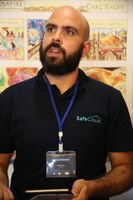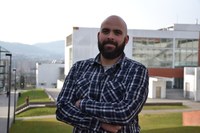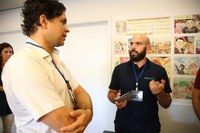Limelight
In a universe of more than 1200 collaborators, there are many months when there is more than one collaborator with a performance suitable for “Limelight”. An example of this is the fact that for several months we receive more than one nominee. This led to a change in the publication policy: BIP has started to highlight all nominees, without considering the merit (because all nominees have much merit!). Additionally, considering the criteria for news opportunity, an interview with one of the nominees is developed.
This month we spoke with João Paulo (HASLab)
1. How is your collaboration with INESC TEC’s High-Assurance Software Laboratory (HASLab)?
I am a member of HASLab since it was founded. I was a PhD student at the time. So I’ve been following and contributing to the laboratory’s growth and evolution over the last couple of years. The collaboration with other HASLab researchers has been great. There is a strong team spirit, not only within the distributed systems’ group (I’m more close to this group due to my research topics)but also within the many other HASLab groups. For example, I’ve been working with other researchers in research projects and articles on encryption and security of information.

2. What kind of work do you developed on HASLab on a daily basis?
My work has been quite varied. Regarding research, I’m involved in writing scientific articles and developing new ideas and prototypes, which are often connected to European research projects, such as the SafeCloud project. I also have the privilege to do my work in collaboration with other researchers whether from HASLab or from other national and international research centres, when I’m performing this tasks. Besides, I’m fortunate to guide and work with different undergraduate, master and doctoral students from University of Minho. In addition to these tasks, I’m also involved in different project proposals, whether national or European.
3. The nomination mentions the SafeCloud Project. What is it and what is your role in this project?
My main role in this project is to develop new and secure storage and processing solutions for cloud computing. I also perform bureaucratic tasks, for example, writing articles and presenting the project results to European Comission. This project addresses a very interesting and crucial theme for today’s standards. There is increased concern on information privacy of each individual, which is now even covered by a new European legislation. The information privacy is being more and more questioned because the number of third-party access such as Dropbox and Google Drive, which store and process personal information, is increasing. The solutions we are developing in this project are intended to enable these cloud services to continue to offer all the features and performance that users are accustomed to while at the same time making sure the privacy of personal information is always preserved.

4. What are the training activities developed in HASLab and how are you involved in them?
At this moment I’m supervising several HASLab collaborators ranging from undergraduate and master’s degree students to doctoral students. Since my workplace is the University of Minho, I’ve been supervising some projects of students of the Computer Engineering Integrated Master’s Degree. The projects are relevant for their academic training and for INESC TEC. This is a very rewarding work because I can not only teach but also learn from them. Besides, I have the opportunity to bring new collaborators to HASLab, which is crucial for our lab to growth and enhance its research quality.
5. What are your future plans for INESC TEC/HASLab?
I would like to reap the benefits of my work in the near future. Especially, to have the opportunity to coordinate national and European projects from which I am still waiting for the evaluation results, and to new partnerships with other INESC TEC’s groups / centres and universities and national and international research centres. The goal is to build a good foundation for collaborations and guidelines in order to make the work that me and my other colleagues do in HASLab and in INESC TEC more noticeable both nationally and internationally.

6. We will end this interview by asking you to comment on your nomination by the HASLab Coordination:
“HASLab coordination wishes to nominate João Paulo for Limelight. João Paulo has recently led a H2020 EU/Korea proposal and led the work of two papers to be submitted to Sigmetrics and ATC’s conferences. Besides this, João Paulo plays an important role in the SafeCloud project, and also providing support to training activities within the HASLab laboratory.”
I’m very happy to be nominated because it feels like an extra approval of the work I’ve been developing. I would like to emphasise that it wouldn’t be possible for me to achieve the goals without mentioned in the nomination without the Lab’s amazing environment in which I work and without my colleagues’ collaboration and help with whom I interact and work daily. For that reason, I would like to pay particular thanks to them because they really are in the limelight.
Fora de série - mês de fevereiro
- João Paulo, HASLab

“The HASLab coordination wishes to nominate João Paulo for Limelight. João Paulo has recently led a H2020 EU/Korea proposal and the work of two papers to be submitted to Sigmetrics ans ATC’s conferences. Besides this, João Paulo plays an important role in the SafeCloud project, and also providing support to training activities within the HASLab laboratory.” (HASLab Coordination)
- Hélder Fontes, CTM

“The CTM Coordination nominates Hélder Fontes for Limelight of February”. This nomination is based on Hélder taking the lead of the communication tasks in the FP7 SUNNY project, as well as for his nuclear input to SIMBED project under the 3rd Open Call of H2020 Fed4FIRE+ project. The level of excellence in his work, reflected in the success of SIMBED proposal and recognised by SUNNY project partners has contributed decisively to INESC TEC's international affirmation in experimental research in wireless communications networks and will allow the strengthening and creation of strategic international partnerships.” (CTM Coordination)


